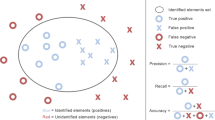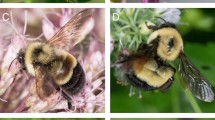Abstract
Solitary bees (Hymenoptera: Apoidea) are endangered by extinction. Furthermore they are highly suited for nature conservancy indication purposes. Nevertheless their appearence in development and ecological planning tasks is quite seldom due to their difficult classification. Our approach to classification of solitary bees is based on two ideas: (1) to use only the veining of the wings for discrimination, (2) to automate measurement, evaluation, and classification using image analysis and a hierarchical classification approach. First results show the functionality and efficiency of our approach even for the classification of species which are very difficult to separate by classical taxonomy.
Access this chapter
Tax calculation will be finalised at checkout
Purchases are for personal use only
Preview
Unable to display preview. Download preview PDF.
Similar content being viewed by others
References
Brückner, D. (1976): The Influence of genertic Variability on Wing Symmetry in Honeybees (Apis Mellifera). Evolution, 30: 100–108, 1976.
Daly, H. V.; Hoelmer, K.; Norman, P.; Allen, T. (1982): Computer-Assisted Measurement and Identification of Honey Bees (Hymenoptera: Apidae). Ann. Entomological Society, 75: 591–594, 1982.
Drescher, W. (1982): Die Eignung der Bienen als Indikatoren für Umweltbelastung. Decheniana - Beiheft (Bonn), 26: 171–177, 1982.
Duda, R. O.; Hart, P. E. (1973): Pattern Classification and Scene Analysis. Wiley & Sons, 1973.
Maul, V.; Hähnle, A. (1994): Morphometric Studies with Pure Bred Stock of Apis Mellifera Carnica from Hessen. Apidologie, 25: 119–132, 1994.
Nazzi, F. (1992): Morphometric Analysis of Honey Bees from an Area of Racial Hybridization in Northeastern Italy. Apidologie, 253: 89–96, 1992.
Rinderer, T.E.; Buco, S.M.; Rubink, W.L.; Daly, H.V.; Stelzer, J.A.; Riggio, R. M.; Baptista, F.C. (1993): Morphometric Identification of Africanized and European Honey Bees using Large Reference Populations. Apidologie, 24: 569–585, 1993.
Ruttner, F. (1952): Zur Dyssymmetrie des Flügelgeäders der Honigbiene. Zeitschr. f. Bienenf., 1: 1–6, 1952.
Schröder, S. (1994): Ein Gattungsschlüssel für Wildbienen unter ausschließlicher Verwendung von Fiigelmerkmalen. Interner Bericht Mai 1994. Institut für landw. Zoologie und Bienenkunde, Universität Bonn, 1994.
Schwenninger, H. R. (1992): Methodisches Vorgehen bei Bestandserhebungen von Wildbienen im Rahmen landschaftsökologischer Untersuchungen. In: Trautner, J. (Ed.), Arten-und Biotopenschutz in der Planung: Methodische Standards zur Erfassung von Tierartengruppen, Ökologie in Forschung und Anwendung 5, 195–202. 1992.
Sheppard, W. S.; Meixner, M. (1994): Additional Mitochondial Characters for Honey Bee Taxonomy. Apoidea, 4, 1994.
Steger, C. (1996): Extracting Curvilinear Sructures: A Differential Geometric Approach. In: Computer Vision — ECCV ’86, Proc. of the 4th Europ. Conf. on Computer Vision, no. 1064 in Lecture Notes in Computer Science, 630–641, 1996.
Vogt, H.-H. (1994): Förderung taxonomischer Arbeiten. Naturwissenschaftliche Rundschau, (2): 67–68, 1994.
Author information
Authors and Affiliations
Editor information
Editors and Affiliations
Rights and permissions
Copyright information
© 1997 Springer-Verlag Berlin Heidelberg
About this paper
Cite this paper
Steinhage, V., Kastenholz, B., Schröder, S., Drescher, W. (1997). A Hierarchical Approach to Classify Solitary Bees Based on Image Analysis. In: Paulus, E., Wahl, F.M. (eds) Mustererkennung 1997. Informatik aktuell. Springer, Berlin, Heidelberg. https://doi.org/10.1007/978-3-642-60893-3_45
Download citation
DOI: https://doi.org/10.1007/978-3-642-60893-3_45
Publisher Name: Springer, Berlin, Heidelberg
Print ISBN: 978-3-540-63426-3
Online ISBN: 978-3-642-60893-3
eBook Packages: Springer Book Archive




